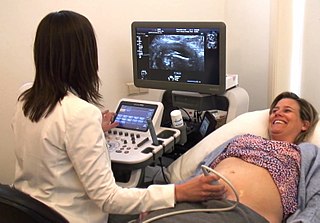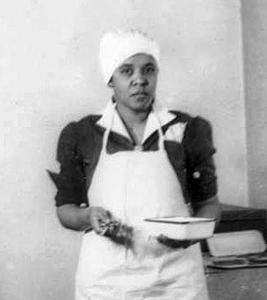Jennie Joseph is a midwife active in the field of maternal health, particularly regarding social and ethnic birthing disparities.
Jennie Joseph is a midwife active in the field of maternal health, particularly regarding social and ethnic birthing disparities.
Joseph studied midwifery in the United Kingdom, her home country. [1] In 1989, she moved to Orlando, Florida, following her partner. [2] Once in the United States, she realized that she had fewer career prospects, due to a lack of knowledge about what midwives do in the country and regulations in the field. Joseph advocated for regulations preventing certified professional midwives (CPM) from practicing. In 1995, she opened a midwifery school. [1]
In 2009, she created the Common-sense Childbirth School of Midwifery, hoping to support women without access to Ob-gyns, who go to the emergency room when in labor. [1] [2] Commonsense Childbirth Inc. operates health clinics and a birthing center, as well as the school. Joseph formulated the maternity-care model The JJ Way, an evidence-based model aimed at reducing birthing disparities. The model aims to help Black women and other marginalized people be safe and empowered within the maternity health systems. [3] [4] Joseph created the term "materno-toxic" to describe the ways the life-threatening impact birthing disparities have on marginalized mothers. [5] Her methods have seen success, with almost all of her patients– most of whom are in groups that face birthing disparities– giving birth to healthy, full-term babies. [4] An evaluation by the West Orange Health Care District found that her patients had significantly lower rates of pre-term birth and low-infant birth weights. It also found that her patients of African descent were almost 40 percent less likely than their national equivalent to have pre-term labor or low-infant birth weights. [4]
In 2020, the Common-sense Childbirth School of Midwifery was accredited by the Midwifery Education Accreditation Council, making her the first Black woman in the United States to privately own a nationally accredited midwifery school. [1]
Joseph also founded the National Perinatal Task Force, a grassroots organization working to eliminate racial disparities in American maternal-child health. She also founded The Council of Midwifery Elders. She is on the Advisory Council for the Congressional Black Maternal Health Caucus and a Fellow of the Aspen Institute. [3]
Joseph is an honorary member of Zeta Phi Beta sorority; she was inducted on July 27, 2024 at the sorority's Boulé in Indianapolis, Indiana. [6]

Midwifery is the health science and health profession that deals with pregnancy, childbirth, and the postpartum period, in addition to the sexual and reproductive health of women throughout their lives. In many countries, midwifery is a medical profession. A professional in midwifery is known as a midwife.
A birthing center is a healthcare facility, staffed by nurse midwives, midwives and/or obstetricians, for mothers in labor, who may be assisted by doulas and coaches. The midwives monitor the labor, and well-being of the mother and the baby during birth. Doulas can assist the midwives and make the birth easier. Should additional medical assistance be required, the mother can be transferred to a hospital. This transfer is more likely if an epidural is needed, there is meconium staining, it is a prolonged labor, or the newborn needs intensive care. Some hospitals have birth centers as an alternative to the usual high tech maternity wards.
A home birth is a birth that takes place in a residence rather than in a hospital or a birthing center. They may be attended by a midwife, or lay attendant with experience in managing home births. Home birth was, until the advent of modern medicine, the de facto method of delivery. The term was coined in the middle of the 19th century as births began to take place in hospitals.
The National Maternity Action Plan (NMAP) is an Australian document prepared by maternity consumer groups to alter the way Governments fund and resource maternity services.

Ina May Gaskin is an American midwife who has been described as "the mother of authentic midwifery." She helped found the self-sustaining community, The Farm, with her husband Stephen Gaskin in 1971 where she markedly launched her career in midwifery. She is known for the Gaskin Maneuver, has written several books on midwifery and childbirth, and continues to educate society through lectures and conferences and spread her message of natural, old-age inspired, fearless childbirth.

The Frontier Nursing Service (FNS) provides healthcare services to rural, underserved populations since 1925, and educates nurse-midwives since 1939.
Sally Tracy is an Australian midwife, midwifery researcher, author and activist. She has authored numerous research articles. In 2023, she was appointed as a Member of the Order of Australia.
Ruth Watson Lubic, CNM, EdD, FAAN, FACNM, is an American nurse-midwife and applied anthropologist who pioneered the role of nurse-midwives as primary care providers for women, particularly in maternity care. Lubic is considered to be one of the leaders of the nurse-midwifery movement in the United States.
Childbirth in rural Appalachia has long been a subject of concern amongst the population because infant mortality rates are higher in Appalachia than in other parts of the United States. Additionally, poor health in utero, at birth, and in childhood can contribute to poor health throughout life. The region's low income, geographic isolation, and low levels of educational attainment reduce both access to and utilization of modern medical care. Traditional medical practices, including lay midwifery, persisted longer in Appalachia than in other U.S. regions.
In the United States, certified nurse midwives (CNMs) are advanced practice registered nurses in nurse midwifery, the nursing care of women during pregnancy and the postpartum period. CNMs are considered as midwives.
Midwives in the United States assist childbearing women during pregnancy, labor and birth, and the postpartum period. Some midwives also provide primary care for women including well-woman exams, health promotion, and disease prevention, family planning options, and care for common gynecological concerns. Before the turn of the 20th century, traditional midwives were informally trained and helped deliver almost all births. Today, midwives are professionals who must undergo formal training. Midwives in the United States formed the Midwifery Education, Regulation, and Association task force to establish a framework for midwifery.
Mary Francis Hill Coley was an American lay midwife who ran a successful business providing a range of birth services and who starred in a critically acclaimed documentary film used to train midwives and doctors. Her competence projected an image of black midwives as the face of an internationally esteemed medical profession, while working within the context of deep social and economic inequality in health care provided to African Americans. Her life story and work exist in the context of Southern granny midwives who served birthing women outside of hospitals.

A midwife is a health professional who cares for mothers and newborns around childbirth, a specialization known as midwifery.

Ronnie Sue Lichtman is an American midwife, educator, writer and advocate for women's health. She has published widely for both lay and professional audiences. The Chair of the Midwifery Education Program at The State University of New York (SUNY) Downstate Medical Center in New York City, she earned a Ph.D. in sociomedical sciences from Columbia University Graduate School of Arts and Sciences, and her MS in Maternity Nursing with a specialization in midwifery from Columbia University School of Nursing. She previously directed the midwifery programs at Columbia University and Stony Brook University.
Margaret Charles Smith was an African-American midwife, who became known for her extraordinary skill over a long career, spanning over thirty years. Despite working primarily in rural areas with women who were often in poor health, she lost very few of the more than 3000 babies she delivered, and none of the mothers in childbirth. In 1949, she became one of the first official midwives in Green County, Alabama, and she was still practicing in 1976, when the state passed a law outlawing traditional midwifery. In the 1990s, she cowrote a book about her career, Listen to Me Good: The Life Story of an Alabama Midwife, and in 2010 she was inducted into the Alabama Women's Hall of Fame.
Eunice Katherine Macdonald "Kitty" Ernst was an American nurse midwife and leader in the nurse-midwife movement in the United States.

Mamie Odessa Hale was a leader in public health and a midwife consultant who worked in Arkansas for the Department of Health from 1945 to 1950. During this time, Hale's objective was to educate and train 'granny midwives.' Her efforts were in place to address the public health disparity between black and white women that was currently evident.
Midwives in South Africa are nurses who focus on the care of pregnant women and the delivery of babies. Midwives have the ability to work independently in cases of healthy pregnancies and problem-free deliveries; however, they can refer patients to gynaecologists or obstetricians when complications are diagnosed. The majority of pregnant women in South Africa use the public healthcare system, and most of this care is provided by midwives.
Jean Robinson is a British activist for patient rights. She was the author of the 1988 pamphlet A Patient Voice at the GMC: A Lay Member's View of the General Medical Council, published by Health Rights. She was the chair of the Patients Association from 1973 to 1975. She served as a lay member of the General Medical Council (GMC) in the 1980s. Robinson was appointed a visiting professor at the School of Health Sciences of the University of Ulster in 1997.

Beverley Ann Lawrence Beech was a Welsh author, chair of the Association for Improvements in the Maternity Services (AIMS) from 1977 to 2017 and an active campaigner against the medicalisation of pregnancy and birth. She raised awareness of the harm that can be done to women in obstetrics during labour and the importance of women being aware of their rights so they can make their own decisions about the place and manner of the birth of their children. She also counselled for a more positive attitude towards home births.